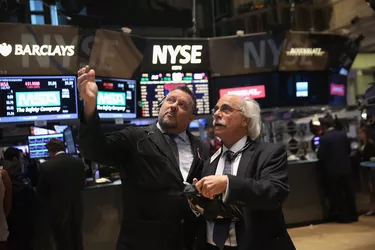
The exchange rate is the value of the American dollar versus other currencies. The value of the dollar is both caused and reflected by interest rates, and interest rates have much to do with stock prices. Therefore, exchange rates affect stock prices and can be used to make predictions about the market.
Exchange Rates
Video of the Day
A weak dollar means American goods are cheaper abroad. It also means foreign goods are more expensive. This suggests consumers will buy American goods. It also means that because money is cheap, the economy will expand, because more businesses will build capital stock, expand their production and continue to borrow money. For the short term, cheap money suggests the stock market will show price rises across the board.
Video of the Day
Interest Rates
The dollar is closely tied to interest rates. A low rate will spur borrowing, while a high rate will slow it down. All other things being equal, cheap money is good for the economy and manifests itself in higher stock prices. This works only for the short term, however, because stocks are always future-oriented. If rates are low today, investors assume that they will rise soon. Therefore, the rise in stock prices resulting from a cheaper dollar leads to short-term price rises only.
Stocks and Bonds
When interest rates are high, dollars are expensive. As a result, money moves to the bond market, where the expected interest rate is the margin of profit. When rates fall, money moves out of bonds and into stocks, pushing prices upward.
Stocks and Currency
Interest rates can and do affect stock prices, and the reverse is also true. According to a 2005 report by Russian economist Desislava Dimitrova, stock prices can affect the value of the dollar. If stock prices begin to fall, foreign investors likely will liquidate some of their stock holdings, which drives the value of the dollar down. She also holds that when stock prices rise, there is a short-term trend toward a cheaper dollar as well, because this reflects an expansionary monetary policy. Therefore, at least for the short term, both increases and declines in stock prices lead to depreciation of the dollar and, hence, its reduction in value. This might sound odd, but it makes sense. Depreciation can develop from two causes. The first is a bad cause, and that is the liquidation of foreign holdings in stock. The second is a good cause, and that is economic expansion, which leads to cheaper money. In both cases, the value of the dollar falls in the short term, but for two very different reasons.